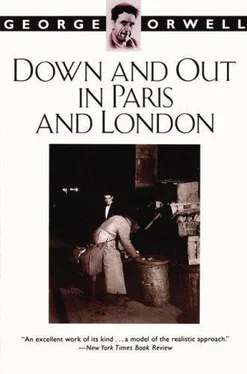George Orwell - Down and Out in Paris and London
Здесь есть возможность читать онлайн «George Orwell - Down and Out in Paris and London» весь текст электронной книги совершенно бесплатно (целиком полную версию без сокращений). В некоторых случаях можно слушать аудио, скачать через торрент в формате fb2 и присутствует краткое содержание. Жанр: Старинная литература, на русском языке. Описание произведения, (предисловие) а так же отзывы посетителей доступны на портале библиотеки ЛибКат.
- Название:Down and Out in Paris and London
- Автор:
- Жанр:
- Год:неизвестен
- ISBN:нет данных
- Рейтинг книги:5 / 5. Голосов: 1
-
Избранное:Добавить в избранное
- Отзывы:
-
Ваша оценка:
- 100
- 1
- 2
- 3
- 4
- 5
Down and Out in Paris and London: краткое содержание, описание и аннотация
Предлагаем к чтению аннотацию, описание, краткое содержание или предисловие (зависит от того, что написал сам автор книги «Down and Out in Paris and London»). Если вы не нашли необходимую информацию о книге — напишите в комментариях, мы постараемся отыскать её.
Down and Out in Paris and London — читать онлайн бесплатно полную книгу (весь текст) целиком
Ниже представлен текст книги, разбитый по страницам. Система сохранения места последней прочитанной страницы, позволяет с удобством читать онлайн бесплатно книгу «Down and Out in Paris and London», без необходимости каждый раз заново искать на чём Вы остановились. Поставьте закладку, и сможете в любой момент перейти на страницу, на которой закончили чтение.
Интервал:
Закладка:
no fires. Two hundred decentish, rather subdued-looking
people were sitting packed on long wooden benches. One
or two officers in uniform prowled up and down. On the
wall were pictures of General Booth, and notices
prohibiting cooking, drinking, spitting, swearing,
quarrelling and gambling. As a specimen of these notices,
here is one that I copied word for word:
"Any man found gambling or playing cards will be
expelled and will not be admitted under any
circumstances.
"A reward will be given for information leading to
the discovery of such persons.
"The officers in charge appeal to all lodgers to
assist them in keeping this hostel free from the
DETESTABLE EVIL OF GAMBLING."
"Gambling or playing cards" is a delightful phrase.
To my eye these Salvation Army shelters, though clean,
are far drearier than the worst of the common lodging-
houses. There is such a hopelessness about some of the
people there-decent, broken-down types who have pawned
their collars but are still trying for office jobs.
Coming to a Salvation Army shelter, where it is
at least clean, is their last clutch at respectability. At the
next table to me were two foreigners, dressed in rags
but manifestly gentlemen. They were playing chess
verbally, not even writing down the moves. One of them
was blind, and I heard them say that they had been
saving up for a long time to buy a board, price half a
crown, but could never manage it. Here and there were
clerks out of work, pallid and moody. Among a group of
them a tall, thin, deadly pale young man was talking
excitedly. He thumped his fist on the table and boasted
in a strange, feverish style. When the officers were out
of hearing he broke out into startling blasphemies
"I tell you what, boys, I'm going to get that job to-
morrow. I'm not one of your bloody down-on-the-knee
brigade; I can look after myself. Look at that notice there!
'The Lord will provide!' A bloody lot He's ever provided me
with. You don't catch me trusting to the
Lord. You
leave it to me, boys.
I'm going to get that job ," etc. etc.
I watched him, struck by the wild, agitated way in
which he talked; he seemed hysterical, or perhaps a little
drunk. An hour later I went into a small room, apart
from the main hall, which was intended for reading. It
had no books or papers in it, so few of the lodgers went
there. As I opened the door I saw the young clerk in there
all alone; he was on his knees, praying. Before I shut the
door again I had time to see his face, and it looked
agonised. Quite suddenly I realised, from the expression
of his face, that he was starving.
The charge for beds was eightpence. Paddy and I had
fivepence left, and we spent it at the "bar," where food
was cheap, though not so cheap as in some common
lodging-houses. The tea appeared to be made
with tea
dust , which I fancy had been given to the
Salvation Army in charity, though they sold it at three-
halfpence a cup. It was foul stuff. At ten o'clock an
officer marched round the hall blowing a whistle.
Immediately everyone stood up.
"What's this for?" I said to Paddy, astonished.
"Dat means you has to go off to bed. An' you has to
look sharp about it, too."
Obediently as sheep, the whole two hundred men
trooped off to bed, under the command of the officers.
The dormitory was a great attic like a barrack room, with
sixty or seventy beds in it. They were clean and tolerably
comfortable, but very narrow and very close together, so
that one breathed straight into one's neighbour's face.
Two officers slept in the room, to see that there was no
smoking and no talking after lights-out. Paddy and I had
scarcely a wink of sleep, for there was a man near us
who had some nervous trouble, shellshock perhaps,
which made him cry out "Pip!" at irregular intervals. It
was a loud, startling noise, something like the toot of a
small motor-horn. You never knew when it was coming,
and it was a sure preventer of sleep. It appeared that Pip,
as the others called him, slept regularly in the shelter,
and he must have kept ten or twenty people awake every
night. He was an example of the kind of thing that
prevents one from ever getting enough sleep when men
are herded as they are in these lodging-houses.
At seven another whistle blew, and the officers went
round shaking those who did not get up at once. Since
then I have slept in a number of Salvation Army
shelters, and found that, though the different houses
vary a little, this semi-military discipline is the same in
all of them. They are certainly cheap, but they are too
like workhouses for my taste. In some of them there is
even a compulsory religious service once or twice a week,
which the lodgers must attend or leave the house. The fact
is that the Salvation Army are so in the habit of thinking
themselves a charitable body that they cannot even run a
lodging-house without making it stink of charity.
At ten I went to B.'s office and asked him to lend me a
pound. He gave me two pounds and told me to come again
when necessary, so that Paddy and I were free of money
troubles for a week at least. We loitered the day in
Trafalgar Square, looking for a friend of Paddy's who
never turned up, and at night went to a lodginghouse in a
back alley near the Strand. The charge was elevenpence,
but it was a dark, evil-smelling place, and a notorious
haunt of the "nancy boys." Downstairs, in the murky
kitchen, three ambiguous-looking youths in smartish blue
suits were sitting on a bench apart, ignored by the other
lodgers. I suppose they were "nancy boys." They looked
the same type as the apache boys one sees in Paris, except
that they wore no sidewhiskers. In front of the fire a fully
dressed man and a stark-naked man were bargaining. They
were newspaper sellers. The dressed man was selling his
clothes to the naked man. He said:
"'Ere y'are, the best rig-out you ever 'ad. A tosheroon
[half a crown] for the coat, two 'ogs for the trousers, one
and a tanner for the boots, and a 'og for the cap and scarf.
That's seven bob."
"You got a 'ope! I'll give yer one and a tanner for the
coat, a 'og for the trousers, and two 'ogs for the rest.
That's four and a tanner."
"Take the 'ole lot for five and a tanner, chum."
"Right y'are, off with 'em. I got to get out to sell my late
edition."
The clothed man stripped, and in three minutes their
positions were reversed; the naked man dressed, and the
other kilted with a sheet of the Daily Mail.
The dormitory was dark and close, with fifteen beds in
it. There was a horrible hot reek of urine, so beastly that at
first one tried to breathe in small, shallow puffs, not filling
one's lungs to the bottom. As I lay down in bed a man
loomed out of the darkness, leant over me and began
babbling in an educated, half-drunken voice:
"An old public school boy, what? [He had heard me
say something to Paddy.] Don't meet many of the old
school here. I am an old Etonian. You know-twenty years
hence this weather and all that." He began to quaver out
the Eton boating-song, not untunefully:
"Jolly boating weather,
And a hay harvest---"
"Stop that----
noise!" shouted several lodgers.
"Low types," said the old Etonian, "very low types. Funny
Читать дальшеИнтервал:
Закладка:
Похожие книги на «Down and Out in Paris and London»
Представляем Вашему вниманию похожие книги на «Down and Out in Paris and London» списком для выбора. Мы отобрали схожую по названию и смыслу литературу в надежде предоставить читателям больше вариантов отыскать новые, интересные, ещё непрочитанные произведения.
Обсуждение, отзывы о книге «Down and Out in Paris and London» и просто собственные мнения читателей. Оставьте ваши комментарии, напишите, что Вы думаете о произведении, его смысле или главных героях. Укажите что конкретно понравилось, а что нет, и почему Вы так считаете.












